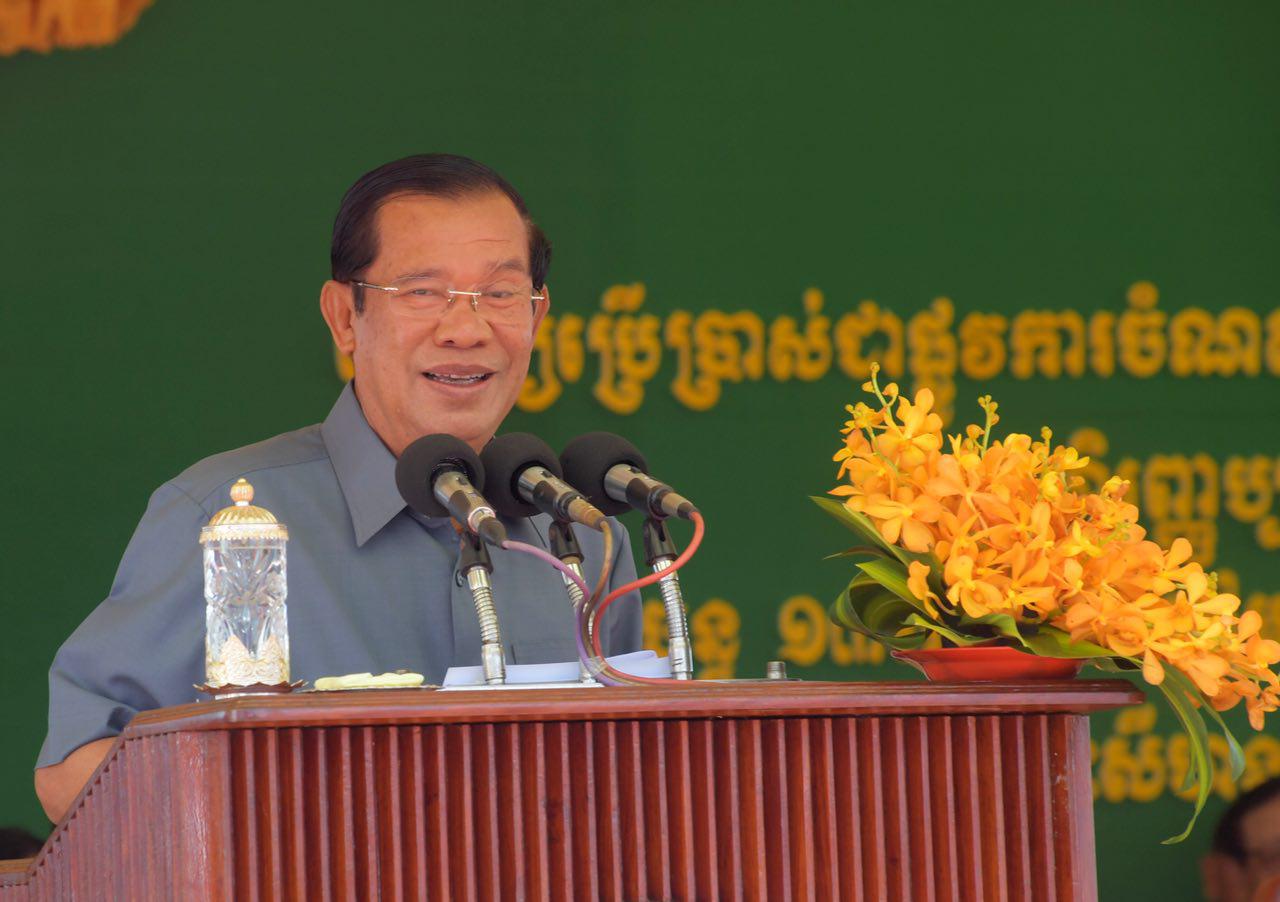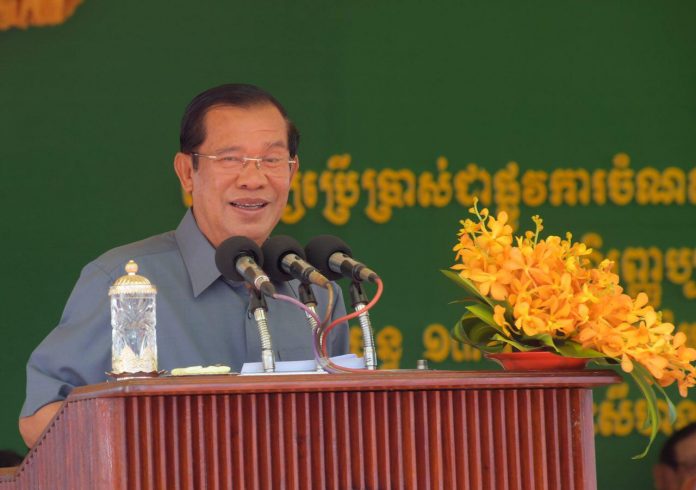Deep-Sea Port to Dock 50,000 DWT Freighters, Work for 60,000 DWT
Today we are here for our nation to welcome a new achievement coming into existence with the financial assistance of Japan, together with the Royal Government’s counterpart fund […] you may note that our port facility was able to serve docking freighters of 10-thousand DWT (deadweight tonnage) loading capacity. With this achievement, the Sihanoukville Multipurpose Terminal (SMT) can now accommodate the 50-thousand DWT freighters. We will continue to deepen waterway to 14.5 meters for SMT to accommodate the 60-thousand DWT cargo ships. We already signed an agreement with Japan on 7 August 2017 […] it is going to cost some 230 million USD […]
Cambodia’s Import and Exports Grown Bigger
Cambodia’s SMT is no longer a place where we only receive goods provided as assistance from other countries or export only a small amount of goods from our country like in past. We have expanded both import and export sizes. Our transport costs have been considered one of the most expensive in the region […] heavy DWT freighters would only dock in Vietnam, Singapore, etc. Smaller DWT freighters would have to come in and load goods from our ports and discharge on to heavy DWT freighters. That meant they had to load and discharge, and discharge and reload. As of now, the 50,000 DWT ships can come and dock in SMT. We no longer have to do all that anymore […]
Deep-water ports Serve 70% of Goods Delivery
We have increased water depth from 13.5 meters to 14.5 meters to serve passage and docking of heavy DWT freighters […] though it is now the sixth phase of development, I think we still have to come up with a plan ready to respond to demands for off-shore transportation […] we will continue to conduct studies, especially with JICA, to expand phase after phase capability to increase transportation through our deep-water ports, which serve delivery up to 70% of import/export goods […]
Seeking Every Means to Prevent Privatization of SMT
I should say something here to highlight role of Japan regarding the developments of SMT, and to prevent it from being sold out after they did so to our airport. Back then, there were many companies seeking for opportune moment to invest in the development of the Sihanoukville Seaport. I did everything I could to prevent privatization of our only seaport in the understanding that should it be privatized, Japan would not have given us loans to develop it. I had to come here very often and keep my eyes on it. One man may have one thought. However, I am sure that our dock workers and staff know how much I have done for keeping this seaport to stay what it is. It is in this meaning that I have made it my journey-day here to meet you, or sent my representative, on 1st of May […]
The 1970’s Coup Brought about Illegal Government to Borrow US Money
(Talking about foreign assistance) there is one thing I should mention to you […] (a former Cambodian regime purchased weapons and) bombs to drop on our people, and they now demand that we must repay them. We are still negotiating. They keep adding up interest. We have to accept inheritance of state debt. We asked to divert the debt into development assistance. They made their point it was difficult for them to explain to the congress. I could not hold it back. I said it was me who had the difficulty to explain it to the National Assembly. The present King of Cambodia is the son of the former King that they brought down in a coup […] it was because of the coup that there was an illegal government who borrow money from (the United States of) America, frankly speaking. I brought that up with (the former President) Obama, and he said it was difficult to explain it to the US congress […] after all, the money borrowed from the US was for what purpose? […] to (the US President) Donald Trump whom I met in the ASEAN-US Summit I said “it was like hammering me and asked me to pay for the hammer’s cost.”
SMT Re-developed With 381 Million USD
Until 1998, Cambodia had fully repaid (its debts to) Japan. It was then that Japan declared allowing Cambodia to borrow new debt. It was the former Ambassador Saito who laid his signature in 1999. The money we borrow from Japan was used in development of this seaport […] that was how we benefit from Japan a credit of low interest rate. We are using now a 40-year loan of low interest rate at 0.01% with a 10 years of grace period. We must pay them back to Japan after 40 years […] for this SMT development project, we have used roughly 381 million USD of Japanese loan to expand and strengthen its capability. We are happy to make it known to everyone that cargo ships of 20,000 to 50,000 DWT loading capacity no longer have to wait in Singapore, in Vietnam, in Thailand, or in Malaysia to reload the goods (from Cambodia’s seaport that could not accommodate them).
Serving Oil Exploration and Exploitation
We also can use ports to deliver services to oil exploration. Previously, in our exploration quest, we have to ship in supplies from Thailand to exploring sites in our sea. As of this time, we can cater to those needs ourselves. We hope to proceed to oil exploration in our sea with less dependency on other countries’ ports […] that are some issues relating to redevelopment of our seaport at Sihanoukville. More goods are coming in and going out of the country and we have to make efforts to expand it stage after stages […] I thank JICA for their professional expertise and studies for the development of SMT. SMT has now come into stock market and JICA also bought some shares too. It will become a major capital for our deep-water port […]
Pressed by Major Financial Institutions to Sell Out Customs
Running my eyes and seeing customs officers sitting over there, one story came into my mind and I think I should bring it up as an advice for people as far as making political decision is concerned […] a number of major financial institutions had in the past pressured me to sell out (privatize) customs, well I may bluntly put it. They should be ashamed of themselves for their mistakes. I did not follow them. Howe many country in this world would have sold out their customs? […] they brought ii to the Cabinet meeting a document regarding privatization of customs. They came up with this idea of half-private and half-state formula […] they have foreign companies ready for it. I made my point that customs is absolutely a sovereign service. I would not let any privatization happens […] there were two foreign experts writing and leaving us letters stating whatever happened should not be them to blame because they also were paid to do the job. We have kept the letters till today […]
Saving to Gradually Pay Debt
For whatever we borrow and owe, we must pay back in principle and interest. We need to save money we make from SMT services to gradually address the duty of paying back. We can borrow more but we also need to repay. This should help us keep debt under control. We also borrow only to cater for demand of development. Take for instance SEA Games, I have asked concerned parties for Cambodian to postpone its turn of organizing it. Even Laos had hosted it already. Cambodia does not go for it yet. If we spend 100 or 200 million USD of our limited resources for SEA Games, with what money do we use to develop our seaport? Japan would let Cambodia borrow money to develop the seaport. They would not allow us to access loan for organizing SEA Games […] Japan would look into projects that interacting with economic progresses. Without a higher capacity seaport, how could we cater to demand of our growing import-export? […]
Peace and Development Prevail with Continued CPP’s Leadership
We are now in a state of development. We need to guarantee peace and development. You may know already that the best way to do it is to vote for the Cambodian People’s Party, whose slot position on a ballot is number 20. The man who is speaking in front of you is the one who has actualized such guarantees. It is not something unseen. There will be 20 political parties contesting in the forthcoming 29-July-2018 general elections. I am sure our people will go to vote for whatever party they may like or trust. However, I continue to appeal that should you want to vote for the Cambodian People’s Party. No one would ask voters to vote for other parties […] in my capacity as President of the Cambodian People’s Party, I also ask voters to choose my party. I do not force them. They may choose whatever party they like. However, they should be clear that peace and development prevail only with continued leadership of the Cambodian People’s Party […]./.






